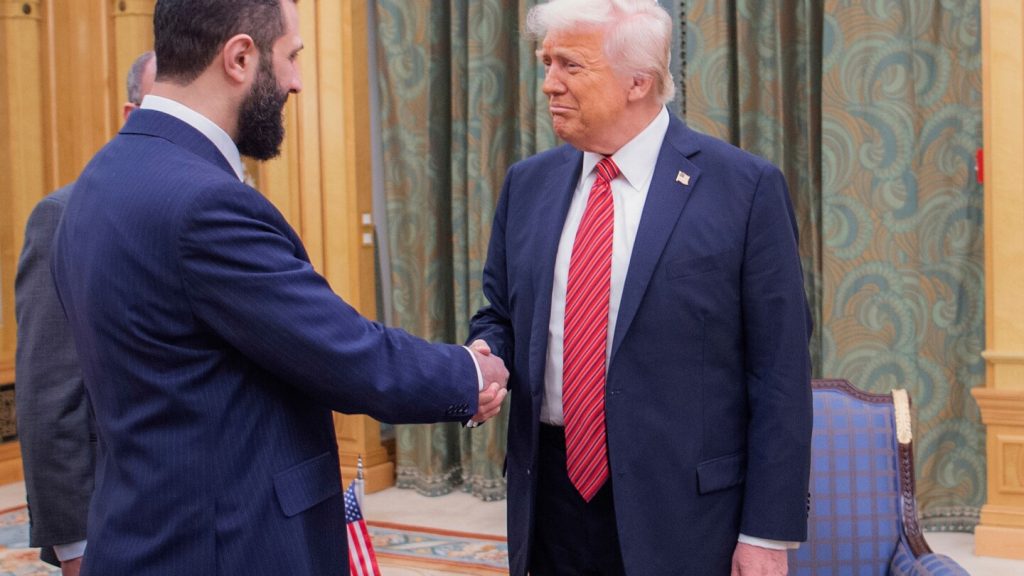Listen to the article
In a historic diplomatic turn, President Donald Trump welcomed Syrian President Ahmad al-Sharaa to the White House on Monday, marking the first visit by a Syrian head of state since the country gained independence from France in 1946. The meeting signifies Syria’s formal entry into the U.S.-led coalition against the Islamic State group and represents a dramatic shift in U.S.-Syrian relations.
Al-Sharaa, who led rebel forces that overthrew former President Bashar Assad last December, was named Syria’s interim leader in January. The meeting follows the United States’ decision to lift sanctions that had been imposed during the decades-long rule of the Assad family.
“This visit is part of the president’s efforts in diplomacy to meet with anyone around the world in the pursuit of peace,” White House press secretary Karoline Leavitt told reporters on Monday.
The Syrian leader’s path to the White House marks an extraordinary personal transformation. Al-Sharaa once maintained ties to al-Qaida and had a $10 million U.S. bounty on his head before emerging as a key U.S. ally in the region. Trump and al-Sharaa first met in May during a summit in Saudi Arabia, where the U.S. president described his Syrian counterpart as a “young, attractive guy. Tough guy. Strong past, very strong past. Fighter.”
That May meeting represented the first official encounter between U.S. and Syrian leadership since 2000, when then-President Bill Clinton met with Hafez Assad, the father of Bashar Assad, highlighting the two-decade diplomatic freeze that existed prior to the recent regime change.
Trump has publicly praised al-Sharaa’s leadership, recently stating that he is “doing a very good job so far” and noting that “a lot of progress has been made with Syria” since sanctions were eased.
According to administration officials, Syria’s entry into the global coalition fighting ISIS will formalize closer cooperation with U.S. forces, although the new Syrian military and the Kurdish-led Syrian Democratic Forces in northeastern Syria had already been conducting operations against the terrorist group. This cooperation represents a significant realignment in Middle Eastern security partnerships.
The diplomatic thaw gained additional momentum last week when the United Nations Security Council voted to lift sanctions on the Syrian president and other government officials. U.S. Ambassador to the U.N. Mike Waltz characterized the vote as a strong indication that Syria has entered a “new era” following Assad’s fall.
For al-Sharaa, securing a permanent repeal of the Caesar Act sanctions remains a top priority. These sanctions were originally implemented in response to widespread human rights abuses committed by the Assad regime and its security forces. While Trump has temporarily waived these sanctions, a permanent repeal would require congressional action.
Two competing legislative proposals are currently being considered on Capitol Hill. Senator Jeanne Shaheen, the top Democrat on the Senate Foreign Relations Committee, has introduced a plan that would end sanctions unconditionally. Meanwhile, Senator Lindsey Graham, a Republican ally of Trump, has proposed a conditional repeal that would be subject to review every six months.
Advocates for full sanctions relief argue that maintaining conditional requirements would effectively prevent international companies from investing in Syria due to fears of potential future sanctions. Mouaz Moustafa, executive director of the Syrian Emergency Task Force, described conditional sanctions relief as a “hanging shadow that paralyzes any initiatives for our country.”
The meeting represents a dramatic shift in U.S. Middle East policy and raises questions about long-term strategic objectives in a region where alliances have proven fluid in recent years. It also highlights the Trump administration’s willingness to pursue unorthodox diplomatic relationships to advance counterterrorism objectives, even with figures previously deemed pariahs by U.S. foreign policy establishments.
Fact Checker
Verify the accuracy of this article using The Disinformation Commission analysis and real-time sources.




12 Comments
Quite an extraordinary turnaround for Syria’s interim leader, going from $10M bounty to White House guest. Curious to see how this relationship evolves.
A historic diplomatic breakthrough, if this meeting can help chart a path to stability in Syria and the broader region. Cautiously optimistic about the potential.
Agreed, this could mark a significant shift in US foreign policy in the Middle East. Curious to see if it leads to tangible progress on the ground.
Quite a dramatic shift in US-Syrian relations. Curious to see how this meeting plays out and what it means for the region’s security and stability.
Indeed, the optics of this are quite remarkable. Lifting sanctions and welcoming a former adversary is a bold diplomatic move by the administration.
Quite a remarkable development. Bringing Syria’s interim leader to the White House is a bold move that could have far-reaching implications.
Intrigued to see how this impacts the US’s relationships with other key players in the region, like Turkey and Russia.
The US-led coalition against ISIS has certainly taken some unexpected turns. Bringing Syria’s interim leader to the White House is a significant development.
It will be interesting to learn more about the agenda and outcomes of this meeting. Diplomacy with former adversaries is always a delicate balance.
This seems like a high-stakes gambit by the President. Engaging directly with Syria’s interim leader could pay dividends, but also carries major risks.
Skeptical about how this will play out domestically. Lifting sanctions on Syria is likely to face pushback from some quarters.
The optics of this meeting are certainly eye-catching. But the real test will be whether it translates into meaningful progress on key regional issues.